(2014春)七年级报纸电子版·牛津深圳版(第14期)
- 格式:doc
- 大小:88.00 KB
- 文档页数:15
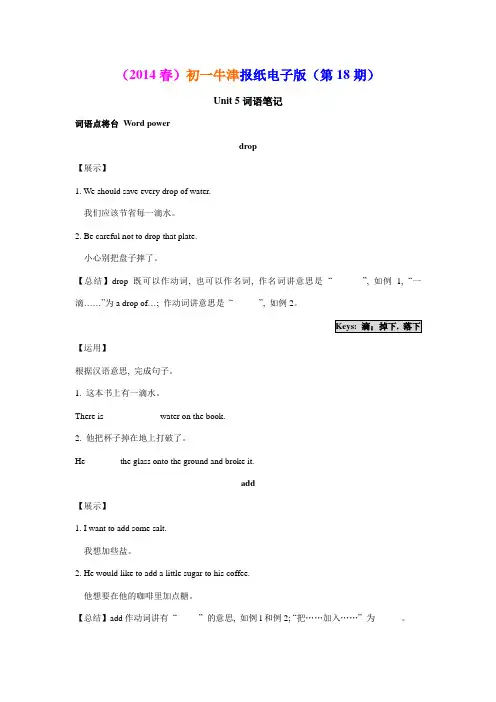
(2014春)初一牛津报纸电子版(第18期)Unit 5词语笔记词语点将台Word powerdrop【展示】1. We should save every drop of water.我们应该节省每一滴水。
2. Be careful not to drop that plate.小心别把盘子摔了。
【总结】drop既可以作动词, 也可以作名词, 作名词讲意思是“_______”, 如例1, “一滴……”为a drop of…; 作动词讲意思是“______”, 如例2。
Keys: 滴;掉下, 落下【运用】根据汉语意思, 完成句子。
1. 这本书上有一滴水。
There is __ _______ __ water on the book.2. 他把杯子掉在地上打破了。
He _______ the glass onto the ground and broke it.add【展示】1. I want to add some salt.我想加些盐。
2. He would like to add a little sugar to his coffee.他想要在他的咖啡里加点糖。
【总结】add作动词讲有“_____”的意思, 如例l和例2; “把……加入……”为_____。
Keys: 增加, 添加;add…to…【运用】根据汉语意思, 完成句子。
3. 他给这杯水里加了些糖。
He _____ some sugar ______ this glass of water.through【展示】1. The water travels through the pipes.水从管道经过。
2. The sand ran through my fingers.沙子从我的手指缝间漏了下去。
【总结】through可作介词, 意思是“____”, 一般用于动词之后, 如例1, 例2。
Key: 通过, 穿过【运用】根据汉语意思, 完成句子。
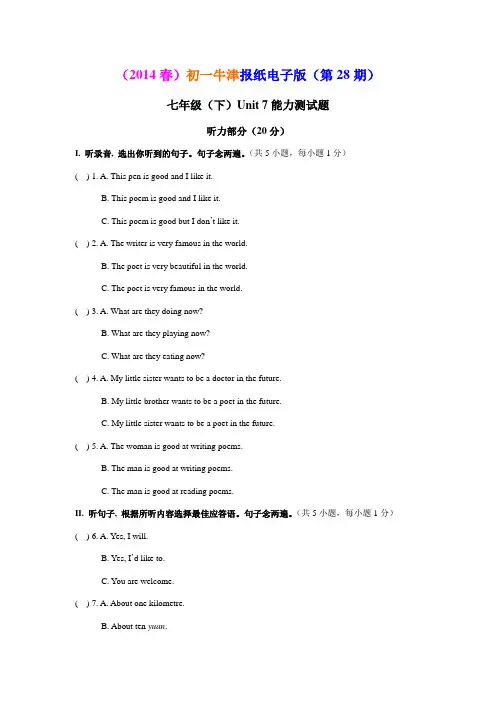
(2014春)初一牛津报纸电子版(第28期)七年级(下)Unit 7能力测试题听力部分(20分)I. 听录音, 选出你听到的句子。
句子念两遍。
(共5小题,每小题1分)( ) 1. A. This pen is good and I like it.B. This poem is good and I like it.C. This poem is good but I don’t like it.( ) 2. A. The writer is very famous in the world.B. The poet is very beautiful in the world.C. The poet is very famous in the world.( ) 3. A. What are they doing now?B. What are they playing now?C. What are they eating now?( ) 4. A. My little sister wants to be a doctor in the future.B. My little brother wants to be a poet in the future.C. My little sister wants to be a poet in the future.( ) 5. A. The woman is good at writing poems.B. The man is good at writing poems.C. The man is good at reading poems.II. 听句子, 根据所听内容选择最佳应答语。
句子念两遍。
(共5小题,每小题1分)( ) 6. A. Yes, I will.B. Yes, I’d like to.C. You are welcome.( ) 7. A. About one kilometre.B. About ten yuan.( ) 8. A. Yes, she is.B. No, she can’t.C. Yes, she was.( ) 9. A. It’s expensive.B. I go to work by car.C. Taking a plane.( ) 10. A. It’s interesting.B. I wrote it.C. You must be tired.III. 听对话, 根据对话内容选择最佳答案。
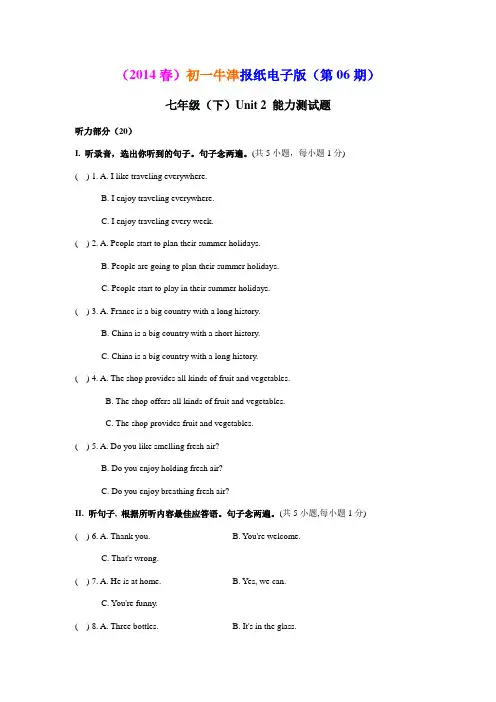
(2014春)初一牛津报纸电子版(第06期)七年级(下)Unit 2 能力测试题听力部分(20)I. 听录音,选出你听到的句子。
句子念两遍。
(共5小题,每小题1分)( ) 1. A. I like traveling everywhere.B. I enjoy traveling everywhere.C. I enjoy traveling every week.( ) 2. A. People start to plan their summer holidays.B. People are going to plan their summer holidays.C. People start to play in their summer holidays.( ) 3. A. France is a big country with a long history.B. China is a big country with a short history.C. China is a big country with a long history.( ) 4. A. The shop provides all kinds of fruit and vegetables.B. The shop offers all kinds of fruit and vegetables.C. The shop provides fruit and vegetables.( ) 5. A. Do you like smelling fresh air?B. Do you enjoy holding fresh air?C. Do you enjoy breathing fresh air?II. 听句子, 根据所听内容最佳应答语。
句子念两遍。
(共5小题,每小题1分) ( ) 6. A. Thank you. B. You're welcome.C. That's wrong.( ) 7. A. He is at home. B. Yes, we can.C. You're funny.( ) 8. A. Three bottles. B. It's in the glass.C. It's a cup.( ) 9. A. Yes, I am. B. Yes, I do.C. Yes, I'd like to.( ) 10. A. I like to go there by bus. B. It is not here.C. You can go there by bus.III.听对话,根据对话内容选择最佳答案。
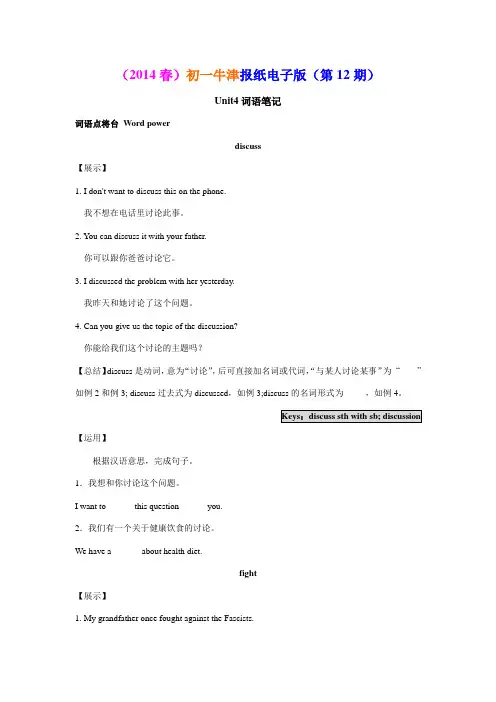
(2014春)初一牛津报纸电子版(第12期)Unit4词语笔记词语点将台Word powerdiscuss【展示】1. I don't want to discuss this on the phone.我不想在电话里讨论此事。
2. You can discuss it with your father.你可以跟你爸爸讨论它。
3. I discussed the problem with her yesterday.我昨天和她讨论了这个问题。
4. Can you give us the topic of the discussion?你能给我们这个讨论的主题吗?【总结】discuss是动词,意为“讨论”,后可直接加名词或代词,“与某人讨论某事”为“____”如例2和例3; discuss过去式为discussed,如例3;discuss的名词形式为_____,如例4。
Keys:discuss sth with sb; discussion 【运用】根据汉语意思,完成句子。
1.我想和你讨论这个问题。
I want to ______this question______ you.2.我们有一个关于健康饮食的讨论。
We have a ______ about health diet.fight【展示】1. My grandfather once fought against the Fascists.我的祖父曾经与法西斯分子作斗争。
2. We should fight against pollution.我们应该与污染作斗争。
【总结】fight为动词,意思是“与……作斗争”,后一般加介词______,如例1和例2。
fight 过去式为______.Keys: against; fought 【运用】根据汉语意思,完成句子。
3.很多人曾经与贫困作斗争。
Many people once ______ ______ poverty.4.我们必须与暴力作斗争。
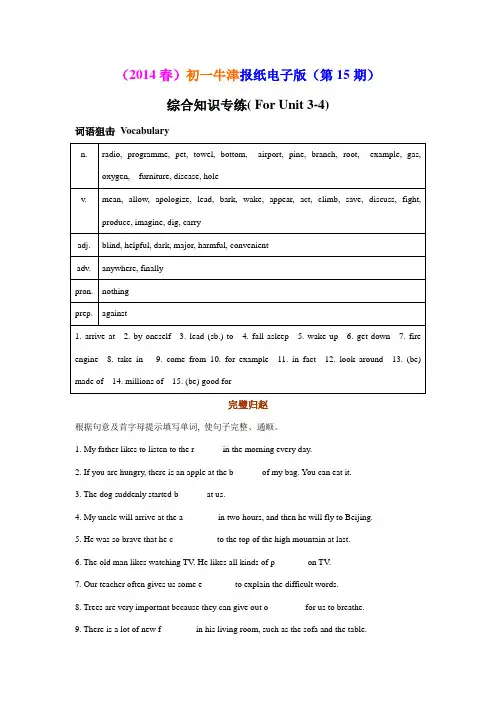
(2014春)初一牛津报纸电子版(第15期)综合知识专练( For Unit 3-4)词语狙击Vocabularyn. radio, programme, pet, towel, bottom, airport, pine, branch, root, example, gas, oxygen, furniture, disease, holev. mean, allow, apologize, lead, bark, wake, appear, act, climb, save, discuss, fight, produce, imagine, dig, carryadj. blind, helpful, dark, major, harmful, convenientadv. anywhere, finallypron. nothingprep. against1. arrive at2. by oneself3. lead (sb.) to4. fall asleep5. wake up6. get down7. fire engine8. take in9. come from 10. for example 11. in fact 12. look around 13. (be) made of 14. millions of 15. (be) good for完璧归赵根据句意及首字母提示填写单词, 使句子完整、通顺。
1. My father likes to listen to the r ______in the morning every day.2. If you are hungry, there is an apple at the b______ of my bag. You can eat it.3. The dog suddenly started b______ at us.4. My uncle will arrive at the a _______ in two hours, and then he will fly to Beijing.5. He was so brave that he c _________ to the top of the high mountain at last.6. The old man likes watching TV. He likes all kinds of p_______ on TV.7. Our teacher often gives us some e_______ to explain the difficult words.8. Trees are very important because they can give out o________ for us to breathe.9. There is a lot of new f _______ in his living room, such as the sofa and the table.10. It is d______ outside at night, but the man has to go out to work.中西合璧根据句意及汉语提示填写单词,使句子完整、通顺。
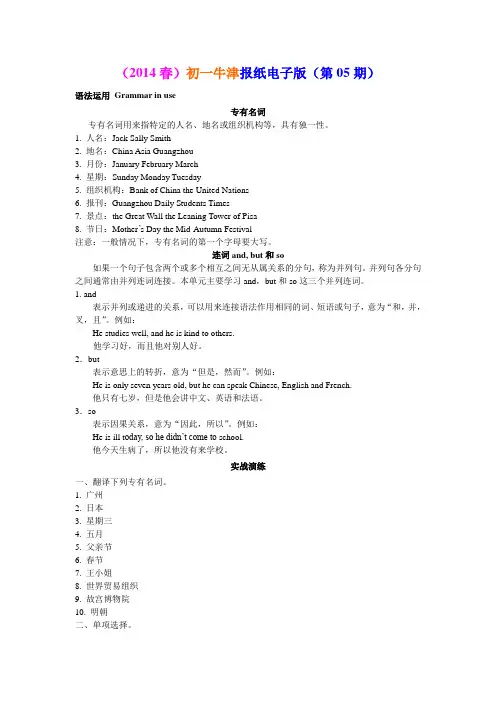
(2014春)初一牛津报纸电子版(第05期)语法运用Grammar in use专有名词专有名词用来指特定的人名、地名或组织机构等,具有独一性。
1. 人名:Jack Sally Smith2. 地名:China Asia Guangzhou3. 月份:January February March4. 星期:Sunday Monday Tuesday5. 组织机构:Bank of China the United Nations6. 报刊:Guangzhou Daily Students Times7. 景点:the Great Wall the Leaning Tower of Pisa8. 节日:Mother’s Day the Mid-Autumn Festival注意:一般情况下,专有名词的第一个字母要大写。
连词and, but和so如果一个句子包含两个或多个相互之间无从属关系的分句,称为并列句。
并列句各分句之间通常由并列连词连接。
本单元主要学习and,but和so这三个并列连词。
1. and表示并列或递进的关系,可以用来连接语法作用相同的词、短语或句子,意为“和,并,叉,且”。
例如:He studies well, and he is kind to others.他学习好,而且他对别人好。
2.but表示意思上的转折,意为“但是,然而”。
例如:He is only seven years old, but he can speak Chinese, English and French.他只有七岁,但是他会讲中文、英语和法语。
3.so表示因果关系,意为“因此,所以”。
例如:He is ill t oday, so he didn’t come to school.他今天生病了,所以他没有来学校。
实战演练一、翻译下列专有名词。
1. 广州___________________2. 日本____________________3. 星期三__________________4. 五月____________________5. 父亲节__________________6. 春节____________________7. 王小姐__________________8. 世界贸易组织____________________9. 故宫博物院_____________________10. 明朝___________________________二、单项选择。
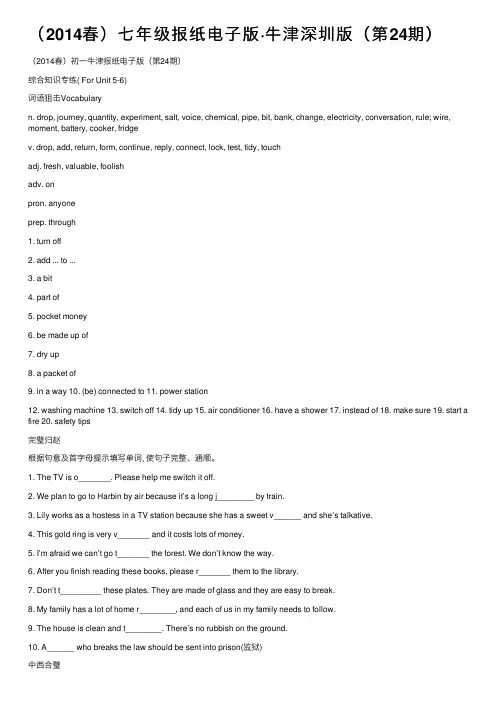
(2014春)七年级报纸电⼦版·⽜津深圳版(第24期)(2014春)初⼀⽜津报纸电⼦版(第24期)综合知识专练( For Unit 5-6)词语狙击Vocabularyn. drop, journey, quantity, experiment, salt, voice, chemical, pipe, bit, bank, change, electricity, conversation, rule; wire, moment, battery, cooker, fridgev. drop, add, return, form, continue, reply, connect, lock, test, tidy, touchadj. fresh, valuable, foolishadv. onpron. anyoneprep. through1. turn off2. add ... to ...3. a bit4. part of5. pocket money6. be made up of7. dry up8. a packet of9. in a way 10. (be) connected to 11. power station12. washing machine 13. switch off 14. tidy up 15. air conditioner 16. have a shower 17. instead of 18. make sure 19. start a fire 20. safety tips完璧归赵根据句意及⾸字母提⽰填写单词, 使句⼦完整、通顺。
1. The TV is o_______. Please help me switch it off.2. We plan to go to Harbin by air because it’s a long j________ by train.3. Lily works as a hostess in a TV station because she has a sweet v______ and she’s talkative.4. This gold ring is very v_______ and it costs lots of money.5. I’m afraid we can’t go t_______ the forest. We don’t know the way.6. After you finish reading these books, please r_______ them to the library.7. Don’t t_________ these plates. They are made of glass and they are easy to break.8. My family has a lot of home r________, and each of us in my family needs to follow.9. The house is clean and t________. There’s no rubbish on the ground.10. A______ who breaks the law should be sent into prison(监狱)中西合璧根据句意及汉语提⽰填写单词, 使句⼦完整、通顺。
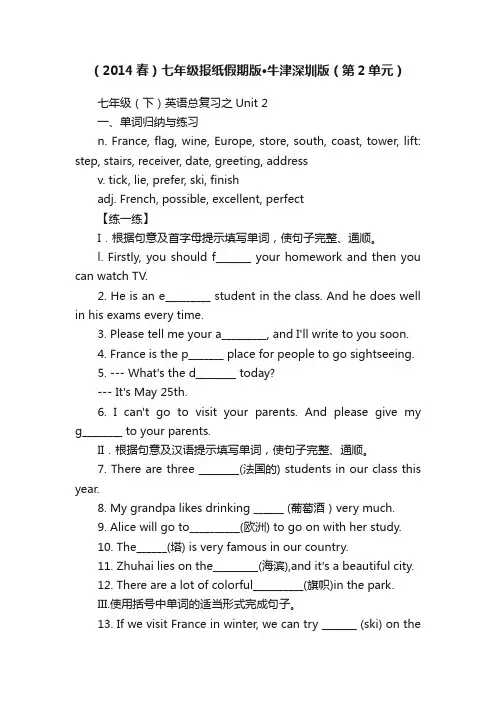
(2014春)七年级报纸假期版·牛津深圳版(第2单元)七年级(下)英语总复习之Unit 2一、单词归纳与练习n. France, flag, wine, Europe, store, south, coast, tower, lift: step, stairs, receiver, date, greeting, addressv. tick, lie, prefer, ski, finishadj. French, possible, excellent, perfect【练一练】I.根据句意及首字母提示填写单词,使句子完整、通顺。
l. Firstly, you should f_______ your homework and then you can watch TV.2. He is an e_________ student in the class. And he does well in his exams every time.3. Please tell me your a_________, and I'll write to you soon.4. France is the p_______ place for people to go sightseeing.5. --- What's the d________ today?--- It's May 25th.6. I can't go to visit your parents. And please give my g________ to your parents.II.根据句意及汉语提示填写单词,使句子完整、通顺。
7. There are three ________(法国的) students in our class this year.8. My grandpa likes drinking ______ (葡萄酒)very much.9. Alice will go to__________(欧洲) to go on with her study.10. The______(塔) is very famous in our country.11. Zhuhai lies on the_________(海滨),and it's a beautiful city.12. There are a lot of colorful__________(旗帜)in the park.III.使用括号中单词的适当形式完成句子。
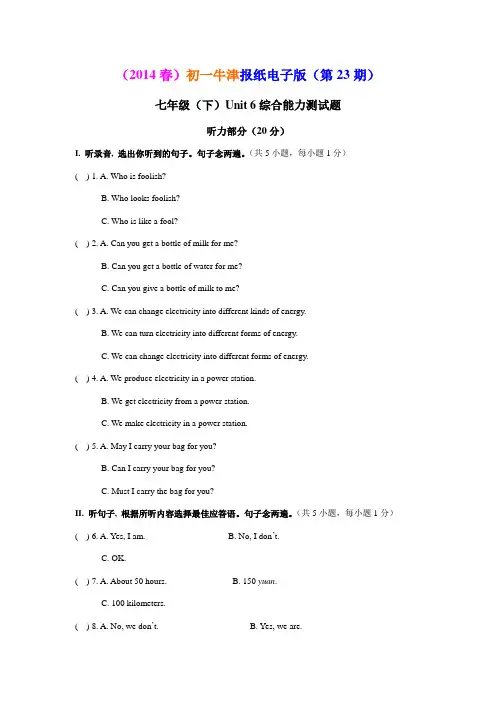
(2014春)初一牛津报纸电子版(第23期)七年级(下)Unit 6综合能力测试题听力部分(20分)I. 听录音, 选出你听到的句子。
句子念两遍。
(共5小题,每小题1分)( ) 1. A. Who is foolish?B. Who looks foolish?C. Who is like a fool?( ) 2. A. Can you get a bottle of milk for me?B. Can you get a bottle of water for me?C. Can you give a bottle of milk to me?( ) 3. A. We can change electricity into different kinds of energy.B. We can turn electricity into different forms of energy.C. We can change electricity into different forms of energy.( ) 4. A. We produce electricity in a power station.B. We get electricity from a power station.C. We make electricity in a power station.( ) 5. A. May I carry your bag for you?B. Can I carry your bag for you?C. Must I carry the bag for you?II. 听句子, 根据所听内容选择最佳应答语。
句子念两遍。
(共5小题,每小题1分)( ) 6. A. Yes, I am. B. No, I don’t.C. OK.( ) 7. A. About 50 hours. B. 150 yuan.C. 100 kilometers.( ) 8. A. No, we don’t. B. Yes, we are.C. Yes, you are.( ) 9. A. Yes, I can. B. I can’t play the guitar.C. I can sing.( ) 10. A. Yes, you did. B. Yes, you can.C. Yes, you are.III. 听对话, 根据对话内容选择最佳答案。
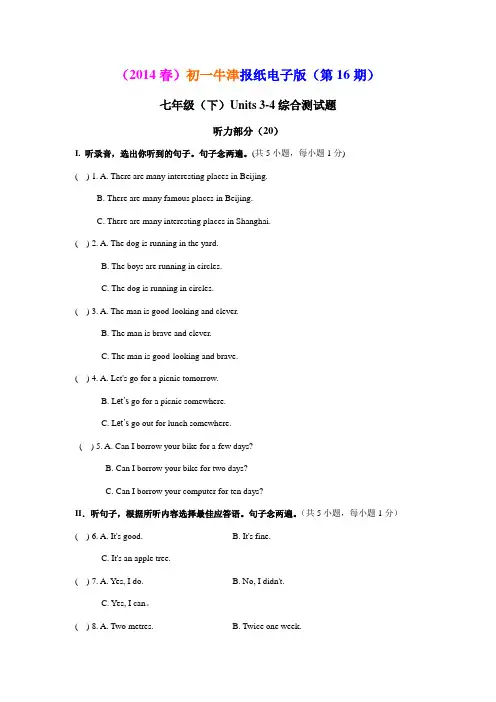
(2014春)初一牛津报纸电子版(第16期)七年级(下)Units 3-4综合测试题听力部分(20)I. 听录音,选出你听到的句子。
句子念两遍。
(共5小题,每小题1分)( ) 1. A. There are many interesting places in Beijing.B. There are many famous places in Beijing.C. There are many interesting places in Shanghai.( ) 2. A. The dog is running in the yard.B. The boys are running in circles.C. The dog is running in circles.( ) 3. A. The man is good-looking and clever.B. The man is brave and clever.C. The man is good-looking and brave.( ) 4. A. Let's go for a picnic tomorrow.B. L et‟s go for a picnic somewhere.C. L et‟s go out for lunch somewhere.( ) 5. A. Can I borrow your bike for a few days?B. Can I borrow your bike for two days?C. Can I borrow your computer for ten days?II.听句子,根据所听内容选择最佳应答语。
句子念两遍。
(共5小题,每小题1分)( ) 6. A. It's good. B. It's fine.C. It's an apple tree.( ) 7. A. Yes, I do. B. No, I didn't.C. Yes, I can。
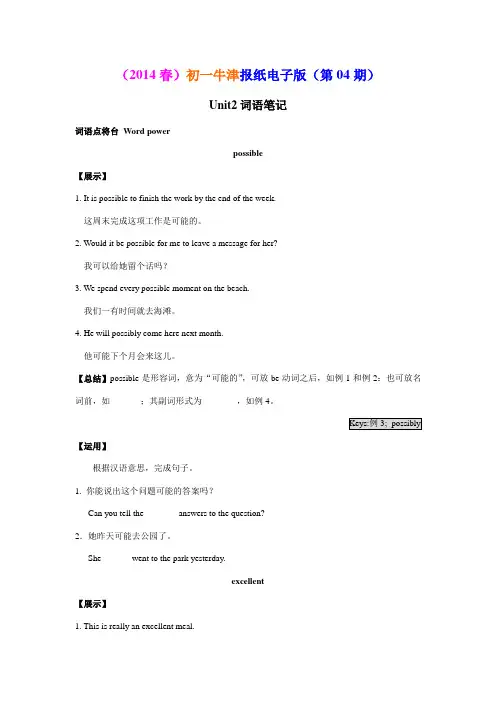
(2014春)初一牛津报纸电子版(第04期)Unit2词语笔记词语点将台Word powerpossible【展示】1. It is possible to finish the work by the end of the week.这周末完成这项工作是可能的。
2. Would it be possible for me to leave a message for her?我可以给她留个话吗?3. We spend every possible moment on the beach.我们一有时间就去海滩。
4. He will possibly come here next month.他可能下个月会来这儿。
【总结】possible是形容词,意为“可能的”,可放be动词之后,如例1和例2:也可放名词前,如_______;其副词形式为________,如例4。
【运用】根据汉语意思,完成句子。
1. 你能说出这个问题可能的答案吗?Can you tell the _______ answers to the question?2.她昨天可能去公园了。
She ______ went to the park yesterday.excellent【展示】1. This is really an excellent meal.这真是一顿美味佳肴。
2. The hotel has excellent service.这旅馆有优质的服务。
【总结】excellent作形容词讲有“优秀的”的意思,可用来修饰名词。
若前面加不定冠词,要用_______,如例1。
【运用】根据汉语意思,完成句子。
3.她会讲非常棒的中文。
She can speak _______ Chinese.4.我认为这个小男孩很优秀。
I think the little boy is very __________.lie【展示】1. The city lies in the center of this country.这个城市位于这个国家的中部。
〔学生双语报第14期〕省市宝安区上寮七年级英语下册 Units 7-8综合测试题〔无答案〕牛津版听力局部〔20分〕I.听录音,选出你听到的句子。
每题念两遍。
〔共5个小题,每题1分〕( ) 1. A. Please give some hot water to me.B. Please give me some useful advice.C. Please bring your homework to me next time.( ) 2. A. Helen thinks ordinary people are also great.B. Helen thinks she often helps ordinary people.C. Helen thinks she is just an ordinary person.( ) 3. A. Mr Green will host the party tomorrow.B. Mr Smith will host the birthday party tonight.C. Mr Green will host the welcome party tonight.( ) 4. A. I grew up in a small but beautiful village.B. I grew up in a big and beautiful village.C. I was brought up in a small but beautiful village.( ) 5. A. One couldn't sail the ocean of life without help.B. No one can sail me ocean of life by himselfC. None can go across me ocean without a big ship.II.听句子,根据所听内容选择最正确应答语。
(2014春)初一牛津报纸电子版(第11期)七年级(下)Unit 3 能力测试题听力部分(20)I. 听录音,选出你听到的句子。
句子念两遍。
(共5小题,每小题1分)( ) 1. A. John knows little about China.B. John knows little about the Chinese culture.C. John knows little about the Chinese history.( ) 2. A. Swimming is Anna's favorite sport.B. Skiing is a popular sport.C. Skiing is Anna's favorite sport.( ) 3. A. My sister is reading cartoon books.B. My sister likes watching cartoon films.C. My sister is watching cartoon films.( ) 4. A. You'll see a park across the road.B. You'll see my school across the road.C. You'll see their school across the road.( ) 5. A. Animals are very important in our life.B. Animals are less important in our life.C. Animals are quite important in our life.II. 听句子,根据所听内容选择最佳应答语。
句子念两遍。
(共5小题,每小题1分)( ) 6. A. Twice a month.B. Four.C. Second.( ) 7. A. It's July 25.B. It's Friday.C. It's 6:18.( ) 8. A. Donuts.B. English.C. China.( ) 9. A. Yes, I won't.B. Yes, I'd like to.C. Yes, I do.( ) 10. A. One hundred and twenty yuan.B. On hundred and eight pages.C. Ten years old.III. 听对话,根据对话内容选择最佳答案。
(2014春)初一牛津报纸电子版(第20期)七年级(下)Unit 5能力测试题听力部分(20分)I. 听录音, 选出你听到的句子。
句子念两遍。
(共5小题,每小题1分)( ) 1. A. Water is quite valuable.B. Fire is quite valuable.C. Water is quite useless.( ) 2. A. We should waste or pollute water.B. We should not waste or pollute water.C. We should not waste or drink water.( ) 3. A. Why don’t you take a coat with you?B. Why don’t you take a camera with you?C. Why don’t you take some water with you?( ) 4. A. Water often falls from the clouds as snow.B. Water often falls from the clouds as waterfalls.C. Water often falls from the clouds as rain.( ) 5. A. People often throw food into the river, so the water is dirty.B. People often throw rubbish into the sea, so the water is dirty.C. People often throw rubbish into the river, so the water is dirty.II. 听句子, 根据所听内容选择最佳应答语。
句子念两遍。
(共5小题,每小题1分)( ) 6. A. Y es, please. B. No, please.C. Y ou’re welcome.( ) 7. A. Thank you. B. Me too.C. Good idea.( ) 8. A. In the river. B. 5:00 o’clock.C. I like it.( ) 9. A. She’s forty years old. B. She’s a teacher.C. She’s tall.( ) 10. A. Y es, they do. B. Y es, I will.C. Y es, I do.III. 听对话, 根据对话内容选择最佳答案。
(2014春)初一牛津报纸电子版(第10期)语法运用Grammar in use【反身代词的用法】反身代词的含义及形式:反身代词是表示动作回到其执行者本身或表示强调代词或名词的一组代词,即句子的宾语和主语为同一对象。
意为“自己;本身;亲自”。
例如:1. We must do our homework by ourselves.我们一定要自己做作业。
2. Did he make the Christmas card by himself? 是他自己做的圣诞贺卡吗?各人称代词的反身代词:人称代词主格反身代词I myselfyou yourselfyou yourselveswe ourselvesthey themselveshe himselfshe herselfit itself反身代词一般作动词或介词的宾语:经常在enjoy, teach, hurt, buy, introduce, seat, dress, express等动词和by,for,to,of等介词后作宾语。
例如:1. I teach myself English.我自学英语。
2. He lives by himself in the country. 他独自住在乡下。
另外,反身代词也可作表语,例如:1. She will be herself again in no time. 她一会儿就会好的。
2. The poor child was myself. 那可怜的孩子就是我。
【介词的用法】介词又称为前置词,它不能单独作句子的成分,必须与名词、代词或相当于名词的其词类、短语构成介词短语才能充当句子成分。
以下是一些常见方位介词的用法:1.at表示“在……处”,一般指较小的比较具体的地点。
例如:He isn't at school. He is at home. 他不在学校,他在家。
2.in表示“在……内部;在……里面”的意思。
(2014春)初一牛津报纸电子版(第07期)综合知识专练( For Unit 1-2)词语狙击Vocabularyn. person, smell, care, joke, support, member, paragraph, France, flag, wine, Europe, store, south, coast, tower, lift, step, stairs, receiver, date, greeting, addressv. forget, miss, laugh, remain, encourage, tick, lie, prefer, ski, finishadj. cheerful, hard-working, patient, smart, strict, successful, French, possible, excellent, perfectadv. probably1. as well2. take care of3. tell jokes4. make fun of5. (be) strict about6. give up7. go to work8. all day and all night9. (be) famous for 10. department store 11. prefer to 12. go on holiday 13. go sightseeing 14. (be) full of 15. stare at 16. wear glasses 17. on this day 18. the capital of 19. on the coast 20. take the lift 21. go down the stairs 22. be known as 23. over the years 24. be closed to 25. at least 26. be good at 27. play table tennis 28. remain friends 29. give support 30. hard work 31. Mother's Day 32. say "Thank you" to 33. make special cards 34. the perfect gift 35. walk up 36. go shopping 37. (be) different from 38. Western Europe 39. think of 40. the difference between 41. such as 42. far away from 43. write to 44. one of 45. over the years 46. for safety reasons 47. happen to 48. in the future 49. a lot of effort完璧归赵根据句意及首字母提示填写单词,使句子完整、通顺。
(2014春)初一牛津报纸电子版(第14期)七年级(下)Unit 4 能力测试题听力部分(20)I. 听录音,选出你听到的句子。
句子念两遍。
(共5小题,每小题1分)( ) 1. A. How can a tree live?B. How long can a tree live?C. Where can a tree live?( ) 2. A. It can pass information to others.B. It can send information to others.C. It can pass information to people.( ) 3. A. He thanked me for my help.B. He thanked me for helping him.C. I thanked him for his help.( ) 4. A. Can you tell me when you leave?B. Can you tell me where you live?C. Can you tell me why you leave?( ) 5. A. There are more and more trees in the world.B. There are a few trees in the world.C. There are fewer and fewer trees in the world.II.听句子,根据所听内容选择最佳应答语。
句子念两遍。
(共5小题,每小题1分)( ) 6. A. Yes, it is. B. No, I don't.C. It's cold.( ) 7. A. Yes, it is cold. B. I'm studying.C. It's sunny now.( ) 8. A. I'm watching TV. B. They are talking.C. They are at home.( ) 9. A. Pretty good. B. I'm well.C. It is going to its home.( ) 10. A. Yes, he is. B. No, she isn't.C. She is a good girl.III.听对话,根据对话内容选择最佳答案。
矿产资源开发利用方案编写内容要求及审查大纲
矿产资源开发利用方案编写内容要求及《矿产资源开发利用方案》审查大纲一、概述
㈠矿区位置、隶属关系和企业性质。
如为改扩建矿山, 应说明矿山现状、
特点及存在的主要问题。
㈡编制依据
(1简述项目前期工作进展情况及与有关方面对项目的意向性协议情况。
(2 列出开发利用方案编制所依据的主要基础性资料的名称。
如经储量管理部门认定的矿区地质勘探报告、选矿试验报告、加工利用试验报告、工程地质初评资料、矿区水文资料和供水资料等。
对改、扩建矿山应有生产实际资料, 如矿山总平面现状图、矿床开拓系统图、采场现状图和主要采选设备清单等。
二、矿产品需求现状和预测
㈠该矿产在国内需求情况和市场供应情况
1、矿产品现状及加工利用趋向。
2、国内近、远期的需求量及主要销向预测。
㈡产品价格分析
1、国内矿产品价格现状。
2、矿产品价格稳定性及变化趋势。
三、矿产资源概况
㈠矿区总体概况
1、矿区总体规划情况。
2、矿区矿产资源概况。
3、该设计与矿区总体开发的关系。
㈡该设计项目的资源概况
1、矿床地质及构造特征。
2、矿床开采技术条件及水文地质条件。